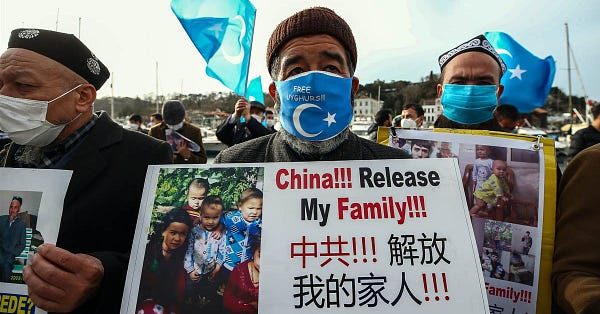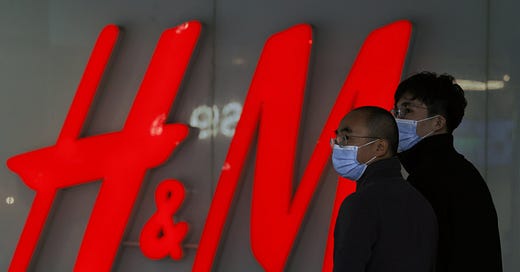Concerns over forced labour in Xinjiang has recently become a hotter topic, with global companies speaking out against it—and facing repercussions. Facebook also noted hackers from China trying to stifle criticism, while politicians around the world face sanctions for addressing the topic. Share this newsletter to draw attention to it all:
Two letters spell enemy
Voicing concern about alleged use of Uighur forced labour in cotton production brought on a backlash against retail giants H&M and Nike. Brands like Adidas and Burberry were also caught in a crossfire that ended up benefitting the stock of Chinese companies. But the Swedish apparel store has faced the most severe repercussions for speaking out:


Chinese ride-hailing app Didi removed H&M locations from all of its maps. At least six of its stores have been shut by landlords across China. Their concern about abuses in Xinjiang dates to H&M’s September 2020 announcement that it would be ending an “indirect” relationship with a supplier linked with those accusations of forced labour.
The anti-social activists


Facebook’s head of cybersecurity policy Nathaniel Gleicher didn’t blame Beijing for hacking the accounts of Uighurs abroad who were critical of China, but noted that the geographical origins of the the activity could be identified. The social network issued a statement detailing the tactics it identified as spurring concerns of cyber espionage.
Striking back at sanctions


Five parliamentarians sanctioned from China were given words of support by Boris Johnson, who’s pledging to create a G7 rival to compete against the Belt and Road initiative from Beijing. The sanctions also targeted the chair and vice chair of the U.S. Commission on International Religious Freedom, and a parliamentarian in Canada:


Michael Chong was targeted along with an entire Canadian federal subcommittee currently studying how the Uighurs and other Muslim minorities are being treated in Xinjiang. Canada has become a particular focus for Chinese censure, with the secret trials of Michael Spavor and Michael Kovrig drawing attention from worldwide diplomats.
Leak fights a lab theory


COVID-19 likely first jumped from bats to humans through another animal, rather than a lab leak, is the conclusion revealed from the World Health Organization’s report from China. The early indication of its contents clash with former U.S. Center for Disease Control chief Robert Redfield saying the virus initially escaped from a lab in Wuhan.
The last words, for now
Ambush Gallery at Australian National University removed three artworks from artist Luke Cornish after hundreds of messages decrying portrayals of Communist China’s founding leader Mao Zedong as Batman. Cornish apologized for that, although the gallery also removed the piece that likened Mao to Winnie the Pooh:



The China Letter is produced by the Canadian Freedom Institute, a think tank based in Canada. We produce the China Letter every week to keep you informed and to press the ideas of free markets and free people not only in China but around the world. Please consider donating to keep this newsletter running!





